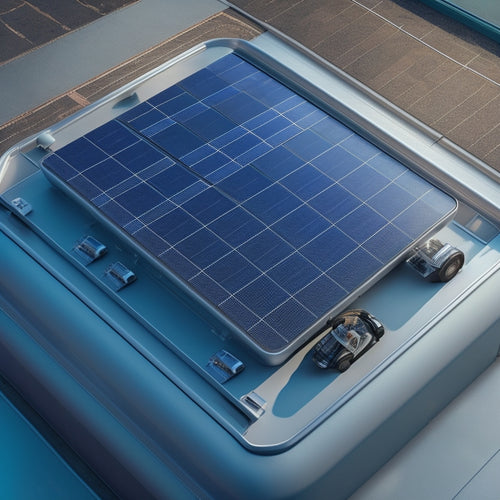
Top Rated Solar Energy Batteries for Homes
Share
When selecting a top-rated solar energy battery for your home, you'll want to reflect on key factors like capacity, depth of discharge, and round-trip efficiency. Leading manufacturers like Tesla, LG, and Sonnen offer high-performance batteries that integrate seamlessly with existing solar systems. The Tesla Powerwall is praised for its design and solar panel integration, while the LG Chem RESU is noted for its high energy density and competitive pricing. As you weigh your options, keep in mind that battery lifespan, energy efficiency rating, and charging speeds are vital considerations. Now, let's explore the specifics to find the best fit for your energy needs.
Key Takeaways
- Top-rated solar energy batteries for homes include Tesla Powerwall, LG Chem RESU, and Sonnen eco battery, praised for design, energy density, and smart grid capabilities.
- Key selection factors include capacity, depth of discharge (DOD), round-trip efficiency, and compatibility with existing solar systems to minimize energy waste.
- Battery lifespan, energy efficiency rating, DOD, and charging/discharge rates are crucial features to consider for optimal performance and cost-effectiveness.
- Higher capacity batteries offer more power but increase upfront costs, while lithium-ion batteries provide higher capacity efficiency than lead-acid batteries.
- Regular maintenance checks, performance monitoring, and site evaluations are necessary to ensure seamless integration, reliable power system performance, and longevity.
Understanding Solar Energy Storage
You're likely familiar with solar panels utilizing energy from the sun, but have you considered what happens when the sun sets or during periods of low sunlight? This is where solar energy storage comes in – an essential component of any solar technology system.
Energy efficiency is greatly improved when you can store excess energy generated during the day for use during the night or on cloudy days.
Solar energy storage systems, typically in the form of batteries, allow you to capture the power of the sun even when it's not shining. This means you can continue to power your home, reducing your reliance on the grid and lowering your energy bills.
By storing excess energy, you can also reduce the amount of energy wasted and increase the overall efficiency of your solar panel system.
When selecting a solar energy storage system, consider factors such as capacity, depth of discharge, and round-trip efficiency. These metrics will help you determine the best battery for your specific needs and guarantee you're getting the most out of your solar technology investment.
Top Brands for Home Batteries
Leading manufacturers have emerged to cater to the growing demand for solar energy storage systems, offering a range of home batteries that vary in capacity, features, and price points.
As you investigate the market, you'll come across top brands like Tesla, LG, and Sonnen, each with their unique strengths and weaknesses. When comparing brands, consider factors like depth of discharge, round-trip efficiency, and warranty duration.
Consumer reviews can provide significant perspectives into real-world performance and reliability. For instance, Tesla's Powerwall is praised for its sleek design and seamless integration with their solar panels, while LG's Chem RESU is lauded for its high energy density and competitive pricing.
Sonnen's eco battery, on the other hand, is known for its advanced smart grid capabilities and long lifespan.
When evaluating brand comparisons, look for data-driven metrics like capacity ratings, cycle life, and charging speeds. This will help you make an informed decision based on your specific energy needs and budget.
Key Features to Consider
Your solar energy storage system's performance hinges on the home battery's essential features. When selecting a battery, you need to evaluate factors that impact its overall efficiency and lifespan.
Battery lifespan is vital, as it directly affects the system's overall cost-effectiveness. Look for batteries with a long lifespan, typically 10-15 years or more, to guarantee you get the most out of your investment.
Energy efficiency is another significant aspect, as it determines how much of the stored energy is actually usable. A high energy efficiency rating means less energy is wasted, resulting in greater overall performance.
Additionally, assess the battery's depth of discharge (DOD), which affects how much of the stored energy can be employed. A higher DOD means more usable energy.
Other essential features to evaluate include the battery's compatibility with your existing solar panel system, its charging and discharging rates, and any certifications or warranties that affirm its quality and reliability.
Battery Capacity and Cost
The capacity-cost tradeoff is a critical factor when selecting a solar energy battery for your home. You'll need to balance the amount of energy you want to store with the cost of the battery.
Battery chemistry plays a significant role in this tradeoff, as different chemistries offer varying levels of capacity efficiency. For example, lithium-ion batteries typically offer higher capacity efficiency than lead-acid batteries, but at a higher cost.
When evaluating battery capacity, reflect on your energy usage patterns and the amount of backup power you need during outages. A higher capacity battery will provide more power, but it will also increase the upfront cost.
You'll need to weigh the benefits of additional capacity against the added expense. Be sure to contemplate the depth of discharge (DOD) and round-trip efficiency when evaluating battery performance. A higher DOD and round-trip efficiency will provide more usable energy and reduce waste.
Installation and Maintenance
When you're preparing to install a solar energy battery system in your home, you'll need to conduct a thorough pre-installation site analysis to guarantee peak performance.
Once installed, you'll want to set up ongoing performance monitoring to track your system's energy production and identify potential issues.
To maximize the lifespan of your battery, you'll also need to schedule regular maintenance checks, typically every 6-12 months, to inspect and replace components as needed.
Pre-Installation Site Analysis
Before solar energy batteries are installed in your home, a detailed site analysis is vital to confirm a seamless integration with your existing electrical infrastructure. This evaluation is essential in determining the ideal battery size and configuration to meet your energy needs.
During the site evaluation, a certified technician will assess your home's electrical load, considering factors such as your energy usage patterns, panel size, and inverter capacity. This data is then used to design a customized battery system that guarantees efficient energy storage and backup power during outages.
The site analysis also involves identifying potential safety hazards and code compliance issues. The technician will inspect your electrical panel, wiring, and connections to verify they can support the added battery system.
Additionally, they'll evaluate your home's structural integrity to determine the best location for the batteries. By conducting a thorough site analysis, you can be confident that your solar energy battery system will operate efficiently, safely, and reliably, providing you with the power you need when you need it.
Ongoing Performance Monitoring
With your solar energy battery system custom-designed and installed, you'll want to verify it continues performing at its best over time. This is where ongoing performance monitoring comes in - a vital aspect of installation and maintenance.
By regularly tracking your system's performance, you can identify potential issues before they become major problems, guaranteeing peak battery efficiency and energy management.
Here are some key aspects to focus on:
-
System output monitoring: Track your system's energy production in real-time to identify any deviations from expected performance.
-
Battery state of charge monitoring: Keep tabs on your battery's charge levels to confirm they're operating within the recommended range.
-
Inverter performance monitoring: Monitor your inverter's efficiency and performance to detect any issues that could impact your system's overall output.
- Environmental monitoring: Track temperature, humidity, and other environmental factors that could affect your system's performance.
Scheduled Battery Maintenance
Regularly servicing your solar energy battery system is vital to maintaining its highest performance and extending its lifespan. You'll want to schedule inspections with certified professionals to guarantee your system operates at peak efficiency. During these inspections, they'll check for signs of wear and tear, clean the system, and perform software updates as needed.
Scheduled battery maintenance is critical to preventing issues that can reduce your battery's lifespan. A well-maintained system can last up to 15 years or more, but neglecting regular servicing can cut that lifespan in half. By staying on top of maintenance, you'll avoid costly repairs, reduce downtime, and guarantee your system continues to provide reliable power.
Your maintenance provider will typically inspect your system every 6-12 months, depending on the manufacturer's recommendations. They'll check the battery's state of charge, voltage, and temperature, as well as inspect the connections and cables for signs of damage.
Real-World Performance Reviews
You're likely wondering how solar energy batteries for homes perform in real-world scenarios.
To give you a better understanding, let's examine the energy storage capacity, battery durability tests, and real-life power output of these systems.
Energy Storage Capacity
When sizing a solar energy battery for your home, energy storage capacity is a critical factor to assess, as it directly impacts the amount of electricity you can store and use during periods of low sunlight or at night.
You'll want to evaluate how much power you need to cover your energy requirements during these periods.
Here are some key considerations to keep in mind when assessing energy storage capacity:
-
Depth of discharge (DOD): A higher DOD means you can use more of the battery's capacity before it needs to be recharged. Look for batteries with a high DOD to maximize your energy storage.
-
Usable capacity: This refers to the actual amount of energy you can use from the battery. Be sure to check the usable capacity of the battery to confirm it meets your needs.
-
Charging cycles: The number of charging cycles a battery can handle affects its overall battery life. Opt for batteries with a high number of charging cycles to minimize replacement costs.
- Round-trip efficiency: This measures how efficiently the battery stores and releases energy. A higher round-trip efficiency means you'll lose less energy during charging and discharging.
Battery Durability Tests
In evaluating solar energy batteries for your home, real-world performance reviews are essential to understanding how a battery will hold up to daily demands. You need to know how well a battery will perform over its lifespan, not just its theoretical capacity.
When evaluating durability, you should look for batteries with high cycle efficiency, which measures how efficiently a battery can charge and discharge over time. A higher cycle efficiency means a longer battery lifespan.
To get a sense of a battery's real-world performance, look for reviews that put batteries through rigorous testing. These tests should simulate daily usage patterns, such as charging and discharging the battery multiple times a day. The test results will give you a clear depiction of a battery's ability to hold its capacity over time.
For example, a battery with a high cycle efficiency of 95% may retain 80% of its original capacity after 5,000 cycles, indicating a longer battery lifespan. By examining these real-world performance reviews, you can make an informed decision about which solar energy battery is right for your home.
Real-Life Power Output
Cycle efficiency gives you a sense of a battery's overall durability, but it's equally important to examine its real-life power output.
You want to know how well the battery performs in actual usage, not just in controlled lab tests. Real-life power output is critical because it directly affects your ability to power your home efficiently.
Here are some key real-world performance metrics to evaluate:
-
Power efficiency: Look for batteries with high power efficiency ratings, typically above 95%. This guarantees that most of the energy stored is actually usable.
-
Discharge cycles: Check how many discharge cycles the battery can handle. A higher number means the battery can supply power more frequently without degrading.
-
Depth of discharge (DOD): Aim for batteries with a high DOD, typically above 80%. This means you can use more of the battery's capacity without reducing its lifespan.
- Round-trip efficiency: This measures the battery's ability to store and release energy efficiently. Look for ratings above 90%.
Frequently Asked Questions
Can I Use Solar Energy Batteries With a Grid-Tied Solar System?
You're utilizing the sun's energy like a farmer cultivates crops, and now you wonder if you can store it for later. Yes, you can use solar energy batteries with a grid-tied system, ensuring battery compatibility and embracing grid independence when the utility company's supply falters.
Are Solar Energy Batteries Eligible for Federal Tax Credits?
You're eligible for federal tax credits on solar energy batteries, which can markedly offset installation costs, especially considering the battery's lifespan; the Solar Investment Tax Credit (ITC) allows you to claim 26% of the total cost.
Do Solar Energy Batteries Require Special Inspections or Permits?
When installing solar energy batteries, you'll need to comply with local building codes and permits, ensuring adherence to installation guidelines and proper battery maintenance to avoid safety hazards and optimize performance.
Can I Expand My Solar Battery System in the Future?
As you're planning your energy independence, you're likely thinking ahead - and coincidentally, so are solar battery manufacturers. You'll be relieved to know that most modern systems are designed for battery compatibility, making future upgrades a seamless process, ensuring your system can adapt to your growing energy needs.
Are Solar Energy Batteries Prone to Overheating or Fires?
You're wise to contemplate battery safety; overheating risks are real, but manufacturers implement safeguards like thermal management systems and flame-retardant materials to mitigate them, ensuring a safe and reliable energy storage solution for your home.
Related Posts
-

Waterproofing Solar Panels for Vehicles: A Step-by-Step Guide
When waterproofing solar panels for your vehicle, start by evaluating your energy requirements and selecting the righ...
-

Why Go Green With Automotive Products Online?
By switching to eco-friendly automotive products online, you're taking a significant step towards reducing your carbo...
-

Top Solar Panels for Car Battery Maintenance
When selecting top solar panels for car battery maintenance, consider high-efficiency models with high wattage output...


